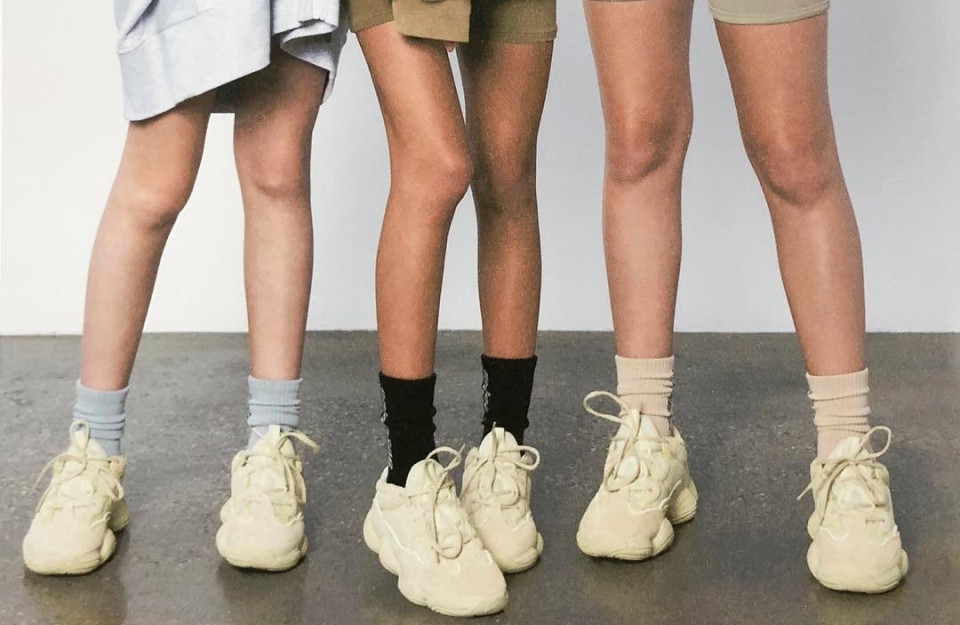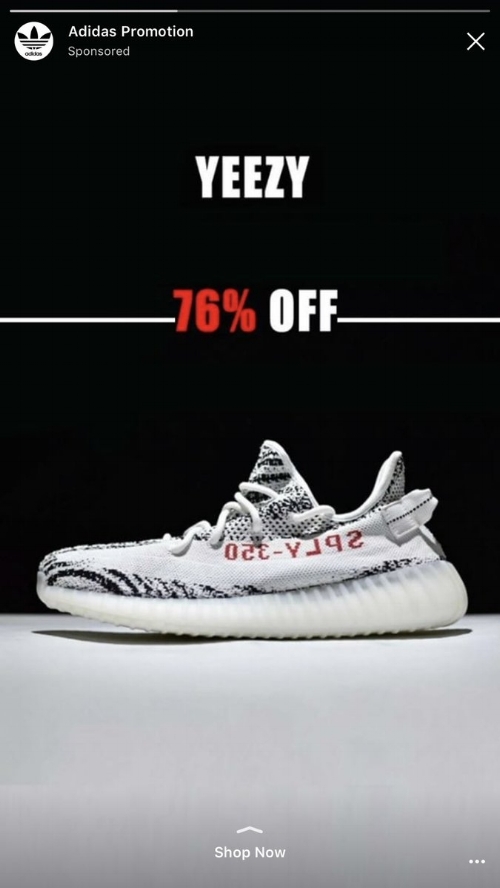
image: Yeezy
Thinking you can trust the websites promoted by social media platforms? Think again – because even seemingly legitimate sites are pointing consumers towards websites selling counterfeits. Case in point: Instagram’s recent promotion of a site boasting adidas x Kanye West’s hot-selling Yeezy Boost 350s. The sponsored post directs Instagram users to a third party website, which is offering Yeezys “on sale” for $99 – an automatic red flag considering that most are being re-sold for upwards of $1,000.
At first glance, the website at issue, www.classicboost.com, appears to be somewhat legitimate. Its photos, for instance, are relatively high quality – likely stolen from authorized retailers – a common tactic amongst sellers of pirated goods. Moreover, while the sneakers it is offering are made in China, the real things are, too. So, while a “Made in China” label is usually a telltale sign that a designer garment or accessory if fake, it isn’t quite as helpful in this instance.
Upon further inspection, there are a number of red flags – aside from damning difference in price – associated with Classic Boost’s site. Primarily, the website is based in China, which usually does not bode well for the authenticity of its goods. Also consider the fact that the site fails to provide any concrete contact information, yet another bad sign. Moreover, a bit of research reveals that the party who registered the Classic Boost domain is associated with nearly 80 other websites, all of which have been flagged by watchdog-type sites, such as Scam Advisor, as “risky” and “unsafe to use.”
Given the limited availability of the Yeezy sneakers in general and their extremely high resale price, it is hardly shocking that a huge slew of websites have popped up selling counterfeit versions. What is interesting is that Instagram is featuring counterfeit-selling sites in its sponsored posts, alongside legitimate companies, such as Michael Kors, Banana Republic, Juice Couture, the Wall Street Journal, Old Navy, Hulu, and Levis, amongst others. In a way, this actually isn’t too surprising, as Instagram’s parent company, Facebook, has come under fire for posting ads for companies offering counterfeit goods, such those promising “Louis Vuitton” bags for $239 or “Ray-Bans” for $30.

IS INSTAGRAM LIABLE?
The fight against counterfeit-selling sites like Classic Boost is a hugely problematic one for brands because the sites are typically generated overseas and hidden behind falsified information, making it very difficult – and sometimes impossible – to track down the culprits. And even if brands are able to have a counterfeit-selling site shut down, the unfortunate truth is that another one will replace it in no time at all. Maintaining not one but a large network of sites is a common practice for counterfeit sellers.
As a result, targeting such sellers is often little more than a futile effort. With this in mind, it is worthwhile to consider whether brands – such as adidas in the case at hand – can hold social media sites liable for posting ads for counterfeit sites? Perhaps looking to Instagram could provide some form of palpable enforcement (and even some damages, as the lawsuits against Chinese counterfeiters very rarely result in monetary gains for design brands for the same reason it is difficult to sue them in the first place – these individuals (and their bank accounts) can be difficult to pin down).
Let’s start with Instagram’s guidelines for advertisers. Per the social networking site’s advertising/promotion guidelines:
Ads on Instagram must not violate the Instagram Community Guidelines [which prohibit the infringement of others’ intellectual property rights]. Additionally, ads must not contain any of the following: Content that infringes upon or violates the rights of any third party, including copyright, trademark, privacy, publicity, or other personal or proprietary rights.
Yet, we know counterfeit items are making the advertising cut. According to a statement from Facebook: “We have a team dedicated to investigating ads and user complaints [on Facebook and Instagram], and we will remove ads that users bring to our attention if they violate our ad guidelines,” and that they “offer the ability for users to provide immediate feedback on our ads and encourage them to report anything they find offensive or misleading.”
Federal law provides some guidance on the matter. For instance, under the Digital Millennium Copyright Act (DMCA), website operators that post unauthorized copyrighted works of others may be liable for copyright infringement, and that includes advertisers. However, a safe harbor is provided under the DMCA to online service providers that take steps, such as registering a copyright agent that receives infringement complaints and establishing a notice and take-down procedure.
The DMCA safe harbor does not apply to trademark infringement claims, though. Two cases offer direction with respect to trademark infringement and the liability of the websites offering the infringing goods. In Tiffany Inc. v. eBay, Inc., Tiffany ultimately wanted the 2nd Circuit court to hold eBay liable for direct and contributory trademark infringement because of the counterfeit items that were being sold on eBay’s website. The court found that it was Tiffany’s responsibility to police its brand and that liability would only be premised on specific knowledge of infringing goods. Worth noting is the fact that eBay removed a counterfeit seller from its site every time Tiffany sent notice to eBay. On the other hand, in Louis Vuitton Malletier v. Akanoc Solutions, Inc., a subsequent 9th Circuit case, Louis Vuitton came out on top because Akanoc, a web-hosting company that owned and operated several servers, had been notified many times by Louis Vuitton about counterfeit goods and did nothing.
The takeaway is this: a brand is primarily responsible for protecting its brand (not a novel concept) and that social networking sites would be well-advised in taking notices of counterfeit and/or infringing advertisements seriously.
Laws aside, Instagram, on paper, at least, seems interested in limiting the sale of counterfeit goods via its advertisements. Facebook is a founding member – along with Google, Twitter, AOL and the Interactive Advertising Bureau – of the Ads Integrity Alliance, a group desiring to set industry standards on how to deal with ads featuring counterfeit goods.
For the time being, the age-old warning that if it seems too good to be true, it probably is, extends to those annoying and sometimes distracting little advertisements that bombard your Instagram feed.










